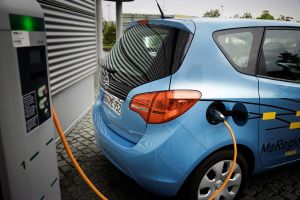Germany is facing a big challenge in the field of mobility. Within a few years, sustainable, electric power trains are to be competitive with highly developed combustion engines. Karlsruhe Institute of Technology (KIT) wishes to be a major actor in this process and to close the gaps in the chain of innovations and values added. For this purpose, it is pooling its competences in the fields of electric stores and power trains under the roof of “Competence E”. Systems-overlapping research is aimed at reducing costs and enhancing the marketability of fabrication processes.
“Research is no longer limited to individual molecules or components, but aimed at developing solutions on the systems level, which also meet industrial requirements,” explains the project head Andreas Gutsch. Interdisciplinary cooperation of 250 scientists from 25 institutes under the “Competence E” project at KIT focuses on transferring innovations from research to the market.
While the components of material, cell, battery, inverter, and engine each still remain to be improved, the largest innovation potential will result when focusing on the complete system. “This is the starting point of our integrated research activities,” says Gutsch. “Only when considering the complete system, will we succeed in reducing the costs of electric power trains and making them competitive on the market.”
Today, about 70% of the component production costs are incurred by fabrication. Only about 30% are associated with the raw materials. Electromobility encompasses all big industries, i.e. automotive manufacture, machine construction, electrical engineering, and chemistry. Under the heading of “low cost is high tech”, it is aimed at developing marketable, interdisciplinary production and fabrication processes parallel to battery and power train development. “It is our objective to construct demonstrators confirming that our components and production lines are mature for industrial use,” Gutsch emphasizes.
For this purpose, a so-called “research factory” is presently being planned at KIT. Here, the chain of values added between research and industry can be closed by establishing prototype production lines for novel batteries and electric engines based on KIT know-how. For setup and research, KIT calculates project costs in the amount of about EUR 200 million until 2018. Similar to other publicly funded large research facilities, such as accelerators and clean-room laboratories, the “research factory” will be open to all partners from industry and research and, thus, contribute to a rapid and wide dissemination of new technologies in Germany. “Competence E focuses on rapidly transferring innovations from Karlsruhe to the market,” Gutsch emphasizes. Apart from education and research, innovation is one of the three pillars of KIT. “We are already approaching industry open-mindedly and actively and will intensify our efforts. We are conducting excellent research for application, not for the drawer.”
The next exciting results of “Competence E”, among others concepts of modular batteries and engines will be presented by KIT at the IAA International Motor Show at Frankfurt/Main in mid-September.
In close partnership with society, KIT develops solutions for urgent challenges – from climate change, energy transition and sustainable use of natural resources to artificial intelligence, sovereignty and an aging population. As The University in the Helmholtz Association, KIT unites scientific excellence from insight to application-driven research under one roof – and is thus in a unique position to drive this transformation. As a University of Excellence, KIT offers its more than 10,000 employees and 22,800 students outstanding opportunities to shape a sustainable and resilient future. KIT – Science for Impact.

